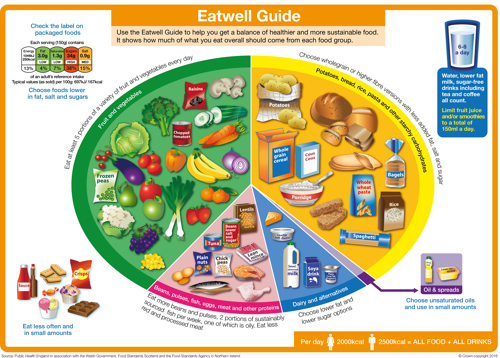Healthy eating on a low-UPF diet
As you now know, this trial was about ultra-processed food (UPF). The scientific evidence shows us that eating a diet low in UPF is best for our health and helps with achieving and maintaining a healthy weight.
However, you may have lost weight on the high UPF diet in the trial, and you may gain weight when trying to follow a low-UPF diet now you have finished the trial.
Why is this?
Well, both the diets you had on the trial followed the Government's Eatwell Guide!
The Guide shows how much of what we eat should come from each food group to achieve a healthy, balanced diet. It gives recommendations on types and amounts of foods and nutrients to eat.
As you reduce your UPF intake over the coming months, it’s important to remember to follow the Eatwell Guide. These recommendations are evidence-based and designed to promote health and avoid nutrient deficiencies. Not every meal we eat needs to be in line with the Eatwell Guide, as long as the balance of your diet is right over the course of the day or week.
Some people who switch to a low UPF diet can focus on trying to cheat the system, by replacing unhealthy UPF products with unhealthy non-UPF products (like swapping a Jammy Dodger for a non-UPF shortbread). Whilst reducing your UPF is important, these kinds of swaps may not lead to weight loss or help you reduce your blood sugar and cholesterol as they still have a poor nutrient profile and are high in calories.
Some easy swaps that can help you eat in line with government recommendations and reduce your fat and calorie intake include switching to semi-skimmed milk, choosing low fat or 0% fat Greek or natural yogurts (that don't have extra added ingredients), and choosing lower fat cheeses like mozzarella rather than cheddar and parmesan.
Here are some easy recipes you can make which are in line with the Eatwell Guide:
Breakfast:
Lunch
Dinner
Check out our recipes page for more, including recipes from the trial and recipes submitted by other participants!
If you're struggling to follow a low-UPF diet, and think emotional eating may be an issue for you, we have provided some resources here which you may like to look at. We also recommend speaking to your GP if you feel like your eating behaviours are negatively affecting you and you would like support.


